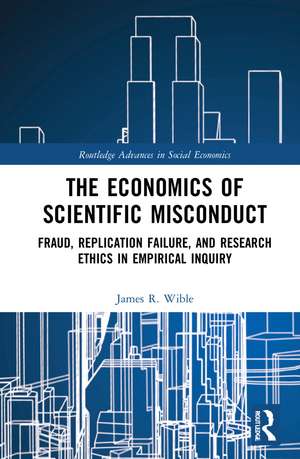The Economics of Scientific Misconduct: Fraud, Replication Failure, and Research Ethics in Empirical Inquiry: Routledge Advances in Social Economics
Autor James R. Wibleen Limba Engleză Paperback – 5 aug 2024
Research misconduct has become an important concern across many natural, medical, and social sciences, including economics, over the past half-century. Initially, a mainstream economic approach to science and scientific misconduct draws from conventional microeconomics and the theories of Becker, Ehrlich, and C. S. Peirce’s "economy of research." Then the works of Peirce and Thorstein Veblen from the 19th century point toward contemporary debates over statistical inference in econometrics and the failure of recent macroeconomic models. In more contemporary economics, clashes regarding discrimination and harassment have led to a Code of Professional Conduct from the American Economic Association and a Code of Ethics from one of its members. The last chapter considers research ethics matters related to the COVID-19 pandemic. There has been an explosion of research and some retractions. More generally, a concern with research ethics contributes to scientific progress by making some of its most difficult problems more transparent and understandable and thus possibly more surmountable.
This book offers valuable insights for students and scholars of research ethics across the sciences, philosophy of science and social science, and economic theory.
| Toate formatele și edițiile | Preț | Express |
|---|---|---|
| Paperback (1) | 350.23 lei 6-8 săpt. | |
| Taylor & Francis – 5 aug 2024 | 350.23 lei 6-8 săpt. | |
| Hardback (1) | 983.38 lei 6-8 săpt. | |
| Taylor & Francis – 18 aug 2022 | 983.38 lei 6-8 săpt. |
Din seria Routledge Advances in Social Economics
-
 Preț: 641.33 lei
Preț: 641.33 lei -
 Preț: 386.77 lei
Preț: 386.77 lei -
 Preț: 310.08 lei
Preț: 310.08 lei - 18%
 Preț: 981.91 lei
Preț: 981.91 lei -
 Preț: 389.27 lei
Preț: 389.27 lei -
 Preț: 456.77 lei
Preț: 456.77 lei -
 Preț: 413.31 lei
Preț: 413.31 lei -
 Preț: 481.07 lei
Preț: 481.07 lei -
 Preț: 279.96 lei
Preț: 279.96 lei -
 Preț: 481.07 lei
Preț: 481.07 lei -
 Preț: 382.87 lei
Preț: 382.87 lei -
 Preț: 463.44 lei
Preț: 463.44 lei - 17%
 Preț: 222.06 lei
Preț: 222.06 lei -
 Preț: 478.02 lei
Preț: 478.02 lei -
 Preț: 479.27 lei
Preț: 479.27 lei -
 Preț: 408.71 lei
Preț: 408.71 lei - 18%
 Preț: 985.71 lei
Preț: 985.71 lei -
 Preț: 461.48 lei
Preț: 461.48 lei - 15%
 Preț: 418.48 lei
Preț: 418.48 lei -
 Preț: 460.52 lei
Preț: 460.52 lei - 17%
 Preț: 257.68 lei
Preț: 257.68 lei - 17%
 Preț: 269.39 lei
Preț: 269.39 lei - 13%
 Preț: 337.39 lei
Preț: 337.39 lei - 15%
 Preț: 420.83 lei
Preț: 420.83 lei -
 Preț: 440.02 lei
Preț: 440.02 lei -
 Preț: 441.89 lei
Preț: 441.89 lei -
 Preț: 377.84 lei
Preț: 377.84 lei - 18%
 Preț: 1364.18 lei
Preț: 1364.18 lei - 18%
 Preț: 1042.36 lei
Preț: 1042.36 lei
Preț: 350.23 lei
Nou
Puncte Express: 525
Preț estimativ în valută:
67.05€ • 68.95$ • 55.62£
67.05€ • 68.95$ • 55.62£
Carte tipărită la comandă
Livrare economică 19 februarie-05 martie
Preluare comenzi: 021 569.72.76
Specificații
ISBN-13: 9781032320854
ISBN-10: 1032320850
Pagini: 328
Ilustrații: 36
Dimensiuni: 156 x 234 mm
Greutate: 0.6 kg
Ediția:1
Editura: Taylor & Francis
Colecția Routledge
Seria Routledge Advances in Social Economics
Locul publicării:Oxford, United Kingdom
ISBN-10: 1032320850
Pagini: 328
Ilustrații: 36
Dimensiuni: 156 x 234 mm
Greutate: 0.6 kg
Ediția:1
Editura: Taylor & Francis
Colecția Routledge
Seria Routledge Advances in Social Economics
Locul publicării:Oxford, United Kingdom
Public țintă
Postgraduate and UndergraduateCuprins
1. Introduction 2. Scientific Misconduct in the Late 20th and Early 21st Centuries 3. Replication Failure, Plagiarism, and Questionable Research Practices in Economics and Psychology 4. The Unusual Economic Fundamentals of Science and Universities 5. The Economics of Replication Failure and the Preference Structures of Scientists 6. The Economics of Fraud in Science and the Preferences of Misbehaving Scientists 7. Peirce’s Economy of Scientific Research, Replication, and Accuracy 8. Questionable Research Practices in Late 19th Century America 9. Peirce’s Economy of Historical Research and His Defense of Aristotle, Plato, and Pythagoras 10. Veblen and Peirce on Contested Research Practices in Economics 11. Contested Research Practices in Econometrics, Methodology, and Macroeconomics 12. From Macroeconomic Controversy to a Code of Conduct for Economists 13. The Credibility of Science During the Pandemic 14. Scientific Misconduct as an Economically Explainable Anomaly
Notă biografică
James R. Wible is a Professor of Economics at the University of New Hampshire in Durham, NH. His research interests are economic methodology related to macro and monetary economics, the economics and philosophy of Charles Sanders Peirce, and the economics of science and research misconduct.
Descriere
The Economics of Scientific Misconduct explores episodes of misconduct in the natural and biomedical sciences and replication failure in economics and psychology over the past half century.
